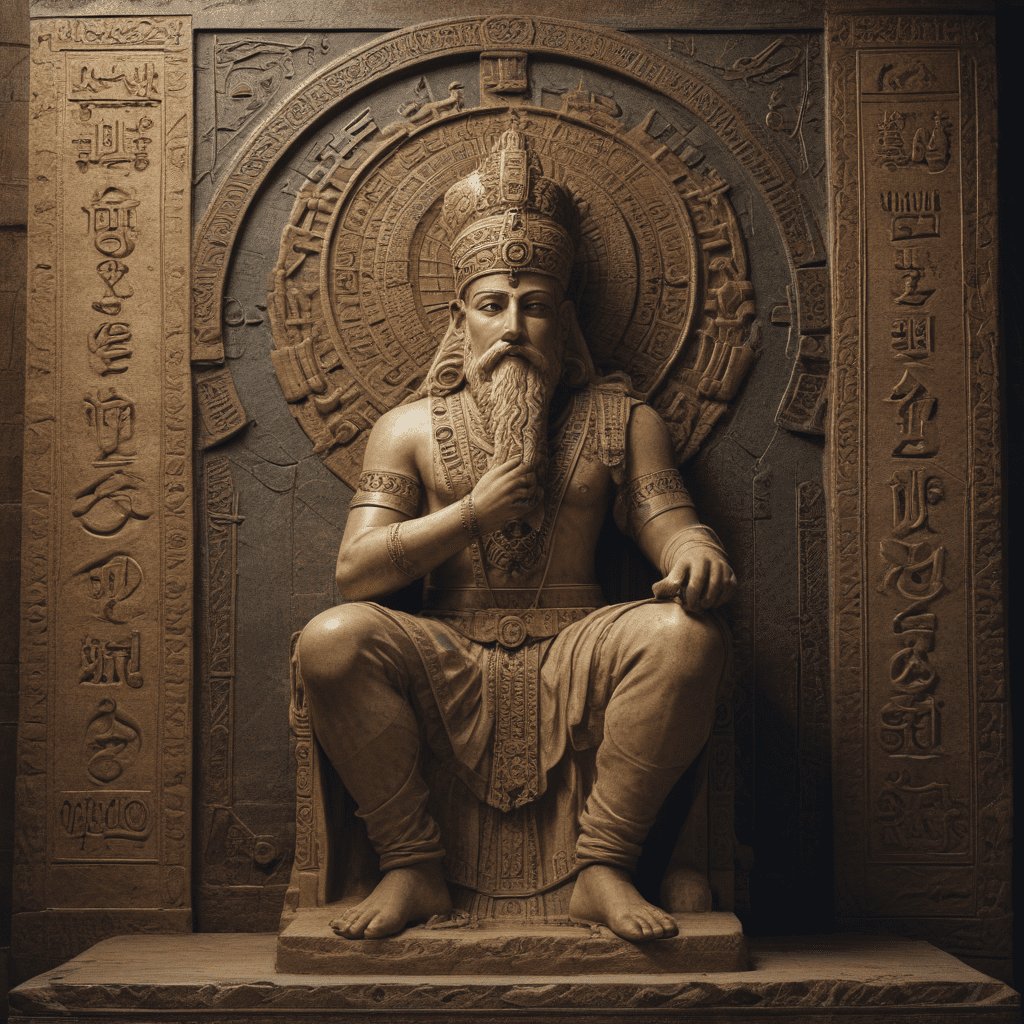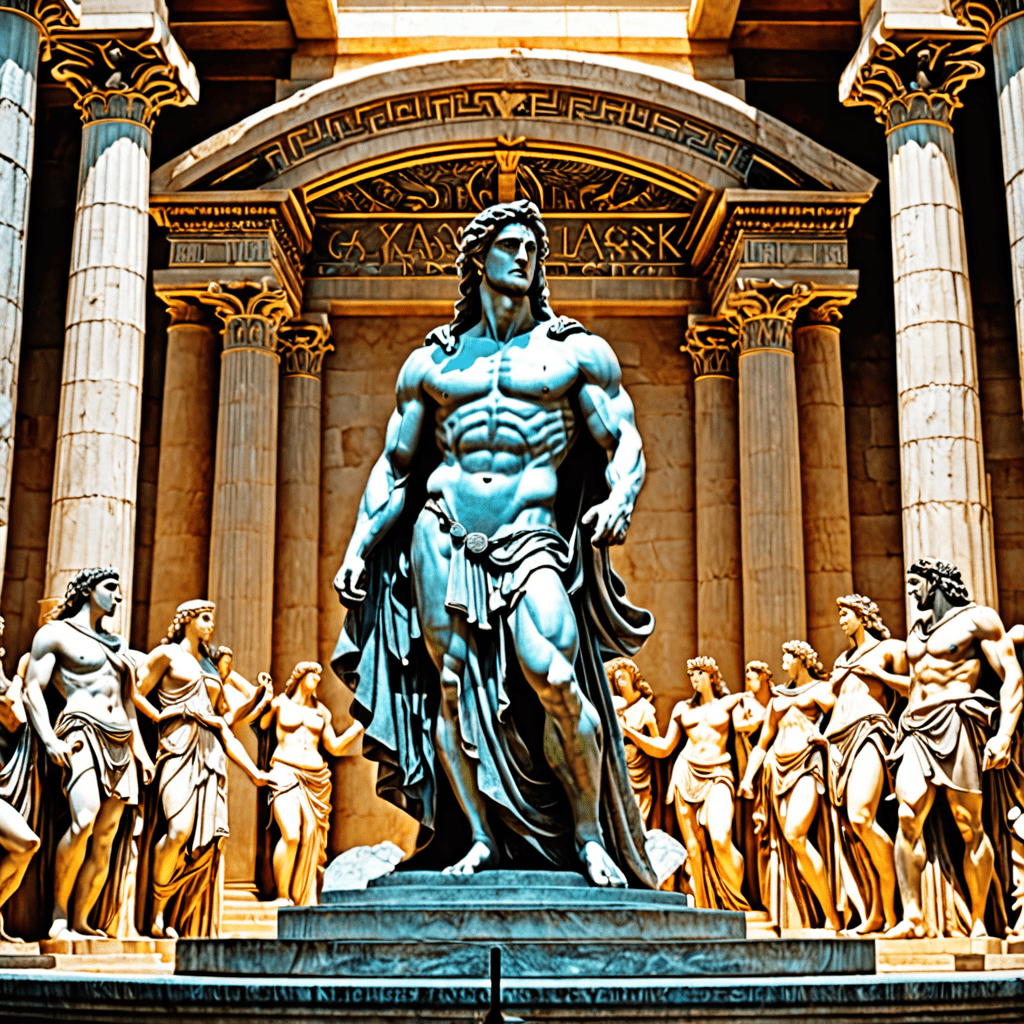I. Introduction:
Nabu: The Mesopotamian God of Wisdom and Writing
In the rich tapestry of Mesopotamian mythology, Nabu stands as a prominent figure, embodying the essence of wisdom and writing. Revered as the son of the mighty Marduk, Nabu played a pivotal role in shaping the intellectual and cultural landscape of ancient Mesopotamia. His cult flourished, leaving an indelible mark on the region's religious and literary traditions.
Nabu's significance extended far beyond the realm of religious beliefs. As the patron deity of scribes, scholars, and intellectuals, he became an integral part of Mesopotamian society. His association with writing and knowledge made him an indispensable figure in the pursuit of education and the preservation of cultural heritage.
This article delves into the multifaceted world of Nabu, exploring his mythological origins, symbolic attributes, and profound impact on Mesopotamian civilization. Through an examination of his temples, rituals, and theological significance, we gain a deeper understanding of the enduring legacy of this Mesopotamian deity of wisdom and writing.
II. Mythology of Nabu:
Divine Lineage and Mythological Associations
Nabu's origins are deeply intertwined with the Mesopotamian pantheon. As the son of Marduk, the supreme god of Babylon, Nabu inherited a legacy of power and authority. His mother, the goddess Sarpanitu, further reinforced his divine lineage.
Mythological accounts portray Nabu as a wise and eloquent deity, renowned for his exceptional knowledge and understanding. He played a vital role in the creation myths, often depicted as the scribe who recorded the destinies of gods and mortals.
Nabu's associations with other deities shed light on his multifaceted nature. His close relationship with Marduk reflected his role as a mediator between gods and humans. In some myths, he is also associated with the god of wisdom, Ea, further emphasizing his connection to knowledge and understanding.
III. Nabu's Attributes and Symbols:
The Stylus and Tablet: Emb emblems of Wisdom and Writing
The stylus and tablet, the quintessential tools of scribes, became the defining symbols of Nabu. These objects represented the power of writing to record, transmit, and preserve knowledge.
In artistic depictions, Nabu is often portrayed holding a stylus and tablet, signifying his mastery over written communication. Temples dedicated to Nabu often featured elaborate carvings and sculptures of these symbolic objects, further emphasizing their significance.
Beyond the stylus and tablet, other symbols associated with Nabu included the dragon, representing his wisdom and power, and the reed plant, symbolizing the material used for writing. These symbols collectively embodied the multifaceted nature of Nabu's attributes.
IV. Temples and Cult Centers of Nabu:
Hubs of Religious Devotion and Intellectual Pursuits
Nabu's cult flourished throughout Mesopotamia, with major temples dedicated to his worship. The most prominent of these temples was located in Borsippa, a city closely associated with the god.
These temples served as centers of religious devotion, where rituals and offerings were performed to appease Nabu and seek his blessings. They also became hubs of intellectual pursuits, attracting scribes, scholars, and students seeking knowledge and guidance.
The rituals associated with Nabu's cult involved elaborate ceremonies and processions. Offerings of food, drink, and precious objects were made to the god, and hymns and prayers were recited in his honor. Festivals and celebrations were held throughout the year, marking significant events in Nabu's mythology and reinforcing his importance in Mesopotamian society.
V. Nabu's Role in Mesopotamian Society:
Nabu held a significant position in Mesopotamian society, particularly among scribes, scholars, and intellectuals. He was considered the patron deity of these professions, providing guidance and inspiration to those who sought knowledge.
Scribes, the literate elite of Mesopotamia, revered Nabu as their protector and guide. They believed that Nabu bestowed upon them the ability to write and read, skills essential for their profession. In return, they offered him prayers and sacrifices, seeking his blessings for their endeavors.
Scholars and intellectuals also looked to Nabu for inspiration and wisdom. They believed that his knowledge and understanding were unsurpassed, making him the ideal source of guidance in their pursuit of truth and knowledge.
Nabu's influence extended beyond the realm of intellectual pursuits. He was also associated with law, justice, and prophecy. In some legal matters, oaths were sworn in his name, reflecting his association with truth and divine judgment.
VI. Theological Significance of Nabu:
Within the Mesopotamian pantheon, Nabu played a crucial theological role as a mediator between gods and humans. He was believed to convey messages from the gods to mortals and to intercede on behalf of humans before the divine.
Nabu was also considered a guardian of cosmic order, ensuring the proper functioning of the universe. His association with wisdom and knowledge was seen as essential for maintaining order and balance in the world.
Furthermore, Nabu was believed to possess divine knowledge, surpassing that of all other deities except his father, Marduk. This made him a source of wisdom and guidance for both gods and humans.
VII. Nabu in the Later Mesopotamian Period:
While Nabu's cult flourished during the height of Mesopotamian civilization, his prominence declined in later periods. The rise of other deities and religious traditions led to a gradual shift in focus.
Despite this decline, Nabu continued to be worshipped and revered in certain regions. Some temples dedicated to him remained active, and his influence can be traced in later Mesopotamian literature and mythology.
VIII. Comparisons with Other Deities of Wisdom:
Nabu shared similarities with other deities of wisdom found in ancient Near Eastern religions. Egyptian god Thoth, for example, was also associated with writing, knowledge, and divine judgment. Similarly, Greek god Hermes and Roman god Mercury were both messengers of the gods and patrons of travelers and merchants.
However, Nabu also possessed unique attributes that distinguished him from these other deities. His close relationship with the supreme god Marduk and his association with cosmic order set him apart as a prominent figure within the Mesopotamian pantheon.
IX. Conclusion: The Enduring Legacy of Nabu
Nabu's legacy continues to resonate in the fields of mythology, religion, and intellectual history. As the Mesopotamian god of wisdom and writing, he played a vital role in shaping the cultural and intellectual landscape of ancient Mesopotamia.
His influence extended far beyond his time, inspiring generations of scholars, writers, and thinkers. Today, Nabu's story continues to be told, reminding us of the enduring power of knowledge, wisdom, and the written word.
X. Frequently Asked Questions (FAQs)
Who was Nabu?
Nabu was the Mesopotamian god of wisdom and writing, son of the supreme god Marduk. He played a significant role in Mesopotamian mythology, religion, and society.
What were Nabu's symbols?
Nabu's primary symbols were the stylus and tablet, representing writing and knowledge. Other symbols associated with him included the dragon, symbolizing wisdom and power, and the reed plant, symbolizing the material used for writing.
Where was Nabu worshipped?
Nabu was worshipped throughout Mesopotamia, with प्रमुख temples dedicated to him in cities like Borsippa. His cult also had influence in other regions of the ancient Near East.
What was the significance of Nabu's role as a mediator between gods and humans?
Nabu's role as a mediator served to bridge the gap between the divine realm and the human world. He conveyed messages from the gods to mortals and interceded on behalf of humans before the divine.



